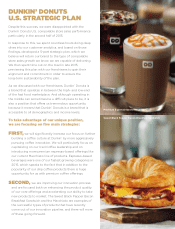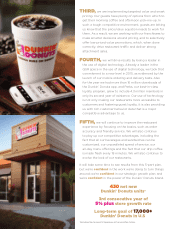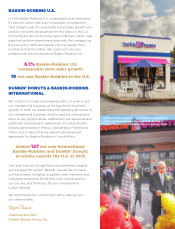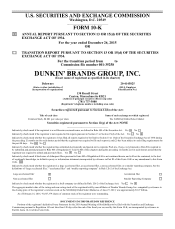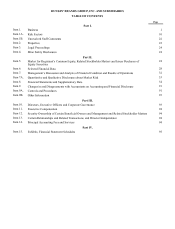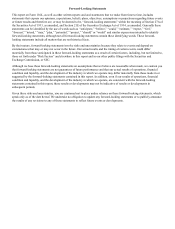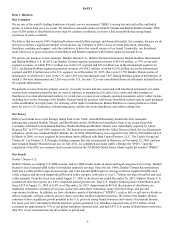Dunkin' Donuts 2015 Annual Report Download - page 13
Download and view the complete annual report
Please find page 13 of the 2015 Dunkin' Donuts annual report below. You can navigate through the pages in the report by either clicking on the pages listed below, or by using the keyword search tool below to find specific information within the annual report.-3-
The typical franchise agreement in the U.S. has a 20-year term. The majority of our franchisees have entered into prime leases
with a third-party landlord. The Company is the lessee on certain land leases (the Company leases the land and erects a
building) or improved leases (lessor owns the land and building) covering restaurants and other properties. In addition, the
Company has leased and subleased land and buildings to other franchisees. When we sublease properties to franchisees, the
sublease generally follows the prime lease term. Our leases to franchisees are typically for an overall term of 20 years.
We help domestic franchisees select sites and develop restaurants that conform to the physical specifications of our typical
restaurant. Each domestic franchisee is responsible for selecting a site, but must obtain site approval from us based on
accessibility, visibility, proximity to other restaurants, and targeted demographic factors including population density and traffic
patterns. Additionally, the franchisee must also refurbish and remodel each restaurant periodically (typically every five and ten
years, respectively).
We currently require each domestic franchisee’s managing owner and/or designated manager to complete initial and ongoing
training programs provided by us, including minimum periods of classroom and on-the-job training. We monitor quality and
endeavor to ensure compliance with our standards for restaurant operations through restaurant visits in the U.S. In addition, a
restaurant operation review is conducted throughout our domestic operations at least once per year. To complement these
procedures, we use “Guest Satisfaction Surveys” in the U.S. to assess customer satisfaction with restaurant operations, such as
product quality, restaurant cleanliness, and customer service.
Store development agreements
We grant domestic franchisees the right to open one or more restaurants within a specified geographic area pursuant to the
terms of store development agreements (“SDAs”). An SDA specifies the number of restaurants and the mix of the brands
represented by such restaurants that a franchisee is obligated to open. Each SDA also requires the franchisee to meet certain
milestones in the development and opening of the restaurant and, if the franchisee meets those obligations, we agree, during the
term of such SDA, not to operate or franchise new restaurants in the designated geographic area covered by such SDA. In
addition to an SDA, a franchisee signs a separate franchise agreement for each restaurant developed under such SDA.
Master franchise model and international arrangements
Master franchise arrangements are used on a limited basis domestically (the Baskin-Robbins brand has one “territory” franchise
agreement for certain Midwestern markets) but more widely internationally for both the Baskin-Robbins brand and the Dunkin’
Donuts brand. In addition, international arrangements include joint venture agreements in South Korea (both brands), Spain
(Dunkin’ Donuts brand), Australia (Baskin-Robbins brand), and Japan (Baskin-Robbins brand), as well as single unit
franchises, such as in Canada (both brands). We are increasingly utilizing a multi-franchise system in certain high potential
markets, including in the United Kingdom, Germany, China, and Mexico.
Master franchise agreements are the most prevalent international relationships for both brands. Under these agreements, the
applicable brand grants the master franchisee the exclusive right to develop and operate a certain number of restaurants within a
particular geographic area, such as selected cities, one or more provinces or an entire country, pursuant to a development
schedule that defines the number of restaurants that the master franchisee must open annually. Those development schedules
customarily extend for five to ten years. If the master franchisee fails to perform its obligations, the exclusivity provision of the
agreement terminates and additional franchise agreements may be put in place to develop restaurants.
The master franchisee is generally required to pay an upfront initial franchise fee for each developed restaurant or an upfront
market development fee, and, for the Dunkin’ Donuts brand, royalties. For the Baskin-Robbins brand, the master franchisee is
typically required to purchase ice cream from Baskin-Robbins or an approved supplier. In most countries, the master franchisee
is also required to spend a certain percentage of gross sales on advertising in such foreign country in order to promote the
brand. Generally, the master franchise agreement serves as the franchise agreement for the underlying restaurants operating
pursuant to such model. Depending on the individual agreement, we may permit the master franchisee to subfranchise within
its territory.
Within each of our master franchisee and joint venture organizations, training facilities have been established by the master
franchisee or joint venture based on our specifications. From those training facilities, the master franchisee or joint venture
trains future staff members of the international restaurants. Our master franchisees and joint venture entities also periodically
send their primary training managers to the U.S. for re-certification.
Franchise fees
In the U.S., once a franchisee is approved, a restaurant site is approved, and a franchise agreement is signed, the franchisee will
begin to develop the restaurant. Franchisees pay us an initial franchise fee for the right to operate a restaurant for one or more



